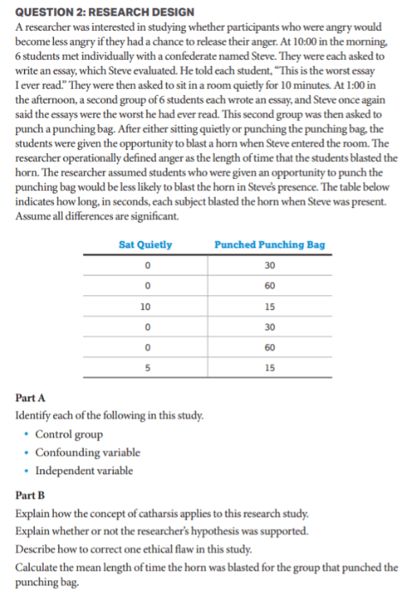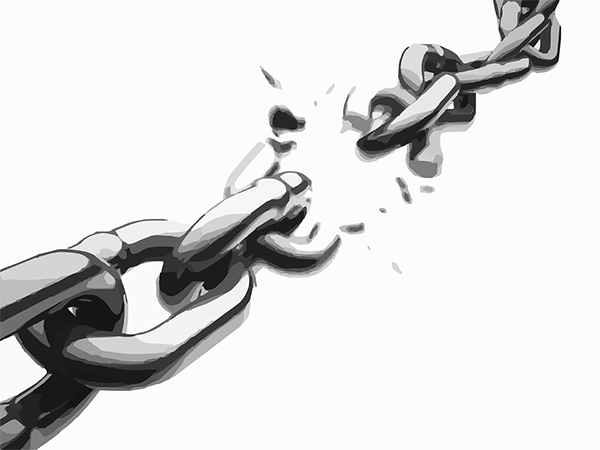Preparing for the AP Psychology exam shouldn't make you lose your sanity (as it were). Some of the material is challenging, but overall it's not that scary compared to other AP tests. As long as you stay focused during your prep and are familiar with the format of the test, you'll have a good chance of acing it!
In this article, we'll go over the structure and content of the AP Psychology exam and explain how you can make the best use of your AP Psychology review time to end up with a great score.
What's the Format of the AP Psychology Exam?
The AP Psychology exam is one of the shorter AP tests, clocking in at just two hours in total. You'll have 70 minutes to complete 100 multiple-choice questions and 50 minutes to answer two free-response questions. Overall, I'd say that AP Psych is one of the easier AP tests based on its shorter length and the complexity of its content.
Here's an overview of the format of the AP Psych exam, which changed slightly in the 2019-20 testing year:
| AP Psychology | Question Type | Time | # of Questions | % of Score |
| Section 1 | Multiple Choice | 70 mins | 100 | 66.7% |
| Section 2 | Free Response | 50 mins | 2 | 33.3% |
| TOTAL | — | 2 hrs | 102 | 100% |
Since you only have 70 minutes for 100 multiple-choice questions, you'll need to make sure you're keeping track of time. It's important that you move relatively quickly because you'll have less than a minute for each question!
Try not to spend more than 30 seconds on a single multiple-choice question; you can always come back to that question later. There is no guessing penalty on multiple choice (as for all AP exams now), so incorrect answers won't hurt your score. In short, always put down something!
The free-response questions shouldn't give you much trouble in terms of time. There are only two of them (much fewer than most other AP tests), and they're usually very straightforward. In many cases, they will just ask you to explain how terms you've learned in AP Psychology relate to a specific situation.
You'll also need some knowledge of the scientific method for certain free-response questions that ask about the methodology of a psychological study. In the next section, we'll take a look at actual examples of AP Psychology multiple-choice and free-response questions.
 No penalties for incorrect answers! Finally, the College Board can lay off all those referees and free up some room in the budget.
No penalties for incorrect answers! Finally, the College Board can lay off all those referees and free up some room in the budget.
What's on the AP Psychology Exam?
The 2020 AP Psychology Course and Exam Description gives a breakdown of the different units covered in the AP Psych course and what percentage of questions they make up on the test. Here are the topics you'll see on the exam:
| AP Psychology Unit | % of Multiple-Choice Questions |
| Unit 1: Scientific Foundations of Psychology | 10-14% |
| Unit 2: Biological Bases of Behavior | 8-10% |
| Unit 3: Sensation and Perception | 6-8% |
| Unit 4: Learning | 7-9% |
| Unit 5: Cognitive Psychology | 13-17% |
| Unit 6: Developmental Psychology | 7-9% |
| Unit 7: Motivation, Emotion, and Personality | 11-15% |
| Unit 8: Clinical Psychology | 12-16% |
| Unit 9: Social Psychology | 8-10% |
This chart could inform how much of your AP Psychology review time you spend studying each big topic, but it's probably more important to pay attention to where you struggle the most on an individual level.
For example, if you know all there is to know about Cognitive Psychology but don't remember that much about Sensation and Perception, you should spend more time reviewing the latter topic, even though it relates to fewer questions.
Next, we'll look at official sample AP Psychology questions.
Multiple-Choice Question Example
Here's an example of a multiple choice question you might see on the test, taken from the 2014-15 Course Description:

This question is kind of wordy, and it might seem as though you need to know a lot to figure it out, but you could in fact still come up with the correct answer without having much psychology knowledge at all (though it's less confusing with some background information).
Here, we're told that the baby monkeys preferred the soft cloth surrogate mother over the wire surrogate with food, indicating that the comfort of the cloth was more important to them than the food when they were scared. The answer, therefore, is B.
Most multiple-choice AP Psychology questions will involve either simple logic, like this one, or basic memorization of the content in the course.
Free-Response Question Example
Here's an example of a free-response question from the 2019-20 Course and Exam Description:

Here, it's easy to see how the points for this second free-response question are earned. The seven bullet points/lines correspond to the 7 possible points you can earn. This question is dependent on a comprehensive knowledge of specific terms and concepts from the AP Psych curriculum. You can see how to earn full points for this question in the official scoring guidelines.
4 Preliminary AP Psychology Study Tips
Here are some tips to keep in mind before you start your AP Psychology exam review. They'll help you stay on track and make the most of your prep time.
#1: Plan Out Your Time
How much time do you have before the AP Psych exam? You'll need to take this into account when formulating your study plan. Think about how much time you can afford to spend studying for AP Psychology while considering the amount of other schoolwork you have.
For example, if you think you'll have about 10 hours to study, your plan might look something like this:
- Take and score a practice test (2.5 hours)
- Go over your mistakes (1 hour)
- Review weak content areas and update your test-taking strategies (2 hours)
- Take and score another practice test (2.5 hours)
- Final review (2 hours)
If you have more time before the exam, you might be able to go more in depth with your mistakes on the second practice test and even take a third or fourth test.
Overall, your time should be split relatively evenly between taking practice tests and reviewing the material. Your plan could change depending on your initial scores and how much you're looking to improve.
I'd say that you don't need to spend more than 20 hours in total studying for AP Psychology. The amount of material isn't overwhelming, and it's not an especially difficult test, so this should be plenty of time. (I'll get more specific on how to use practice tests effectively in the next section.)
#2: Choose Review Materials Wisely
You'll need reliable review materials to ensure you're getting the most out of your study sessions.
I recommend buying a review book (5 Steps to a 5 and Cracking the AP Psychology Exam are the ones I like best). Review books cover just the information you'll need to know for the test, so they are going to be less overwhelming to study than your textbook or notes from class will be.
That said, don't totally ignore the resources you've accumulated in your AP Psychology class. Your notes might include unique methods for remembering concepts and terms, which can be useful as an alternative to the information in a review book. Your textbook could be useful as well because it might have diagrams that are better than the ones in review books.
Overall, I think it's nice to have an AP review book as a backup so that you stay focused on your studying and don't spend time on topics that are less relevant to the exam.
 This wise owl says, "Hoo hooo hoooooo," which translates to "Choose your review materials wisely like I would!" Either that or "They're coming. Tonight."
This wise owl says, "Hoo hooo hoooooo," which translates to "Choose your review materials wisely like I would!" Either that or "They're coming. Tonight."
#3: Focus on Memorizing Terms
The AP Psychology exam is centered around psychological terms and theories. Some of these can be confusing and hard to tell apart (or not what they sound like intuitively). As a result, it's really important to have a solid grasp on all the terms you learned in the course, for both multiple-choice and free-response questions.
Free-response questions will often ask you to explain the relation of an obscure psychology term to a hypothetical scenario, and it's impossible to earn points if you aren't completely confident in your understanding of the meaning of the term.
Flashcards are helpful for this type of memorization. If you have time, you can make flashcards for all the important terms in the class or even just a few terms that always trip you up. These can be physical flashcards or (if that's too old-fashioned) digital flashcards, such as those found on Quizlet (in which case you wouldn't even need to make your own, as there are already loads of user-created study sets available!).
Personally, I find that writing down the definitions of terms will help drill their meanings into your brain more effectively, so I prefer to make my own cards, but you can do whatever works best for your schedule and learning style.
 To put a fun spin on studying and ensure you never forget terms, you can send flashcards that describe psychological disorders to people who seem to have them based on your expert diagnoses. They'll be sure to thank you later. (Disclaimer: if you do this, you are probably a sociopath.)
To put a fun spin on studying and ensure you never forget terms, you can send flashcards that describe psychological disorders to people who seem to have them based on your expert diagnoses. They'll be sure to thank you later. (Disclaimer: if you do this, you are probably a sociopath.)
#4: Go Over Testing Strategies
Before you take a practice test, you should be aware of the testing pitfalls that might impact your score. Don't sacrifice points on practice tests (or the real test!) due to factors unrelated to your knowledge of the material. Here are some strategies for different types of test questions.
Multiple-Choice Questions
As I mentioned earlier, the AP Psych exam doesn't give you a ton of time for each multiple-choice question. If you have the tendency to get stuck on difficult questions, you'll need to keep this in mind during the test.
Try to avoid spending more than 30 seconds on each question (40 max), and don't worry too much about temporarily skipping a few. You should still eventually go back to them and put something down, though, as there's no penalty for incorrect answers. It's perfectly OK to randomly guess on a question you don't know the answer to if you're running out of time.
Also note that it's possible to get a 5 on the AP Psychology test, even if you get wrong around 20 to 30 multiple-choice questions.
Finally, don't let yourself overthink multiple-choice questions. The questions can sound and look complex, but most of the time they're not overly difficult if you know the material. Underline the parts of the question that are most important so that you don't get distracted or start to second-guess yourself. If one of the answers seems as if it doesn't make sense, eliminate it.
Free-Response Questions
On free-response questions, remember that this isn't an English test! There's no need to write an introduction and conclusion—just go straight for the answer to the question. That being said, you should still write in complete sentences with correct grammar. Make it as easy as possible for the graders to find your answers and give you points. Underline verbs like "describe" or "define" in the question to keep yourself focused on the task at hand.
With some free-response questions, it can be easier to work backwards by putting yourself in the position of one of the people in the hypothetical scenario. For example, with the sample question above, you might say to yourself, "If I were involved in a study that required me to punch a punching bag after being told my essay was horrible, how might I react? Why?"
Your 5-Step AP Psychology Review Plan in Action
Here's a basic outline of the steps you should take once you've prepared your materials and made a rough study plan for AP Psychology.
Step 1: Take and Score a Practice Test
The first step is to take a practice test to see how high you're currently scoring. The absolute best tests to take are those created by the College Board, since these will be most similar to what you'll see on test day.
There are three official AP Psychology practice tests available for free as PDFs:
It's a smart idea to prioritize recent exams over older ones. Note, too, that the AP Psychology test underwent some changes in 2020, so you might need to tweak these practice exams slightly.
Here's a conversion table that shows (roughly) how raw composite scores from practice tests translate to the AP scoring scale:
| Raw Composite Score | AP Score |
| 113-150 | 5 |
| 93-112 | 4 |
| 77-92 | 3 |
| 65-76 | 2 |
| 0-64 | 1 |
To calculate your raw composite score, add up the number of multiple-choice questions you answered correctly. Then, consult the scoring rubric for the free-response questions to calculate the number of points you earned on each question (out of 7 each).
Convert the number of points you got on the free-response questions to a value out of 50. For example, if you got 8 out of 14 points on the two free-response questions, you would convert that to about 29 out of 50.
Finally, add the raw score numbers from the multiple-choice and free-response sections together. If you earned 75 points (meaning you got 75 questions correct) on the multiple-choice section and 29 points on the free-response section, your composite score would be 104, making your official AP Score around a 4. See this article for more information on calculating your AP score.
Once you've scored your practice test, you can set a future score goal. This is pretty simple for AP tests because the score range is just 1-5. There's no reason not to aim for a 5 on the test, especially in the case of the AP Psychology exam. Since it's one of the less difficult AP tests, a 5 should be achievable for you if you simply put some effort into studying.
If you're scoring very low right now, though, you could think about aiming for a 3-4 and increasing your goal if you reach it before the test. Even if you're already in the 5 range, you should still consider doing a bit of studying if you have time. It's important to feel as comfortable as possible on test day!
 You want the AP Psychology test to be like an old friend you still pretend to like out of pity.
You want the AP Psychology test to be like an old friend you still pretend to like out of pity.
Step 2: Analyze Your Mistakes
Look at the questions you got wrong or had to guess on in your practice test, and try to figure out why you struggled. Did you forget a term or concept? Were you not sure what the question was asking? Did you make a careless error? Did you run out of time? Which of these issues was most prevalent? Did you notice a certain type of question that you tended to get wrong?
Record your findings on the nature of your mistakes so that you can correct them in your studying. This guide will help you with reviewing your mistakes (I know it's for SAT/ACT practice specifically, but the same principles apply to AP tests).
Step 3: Review Weak Content Areas
If you made a lot of mistakes related to content or question misunderstandings, you should try to figure out which areas caused you the most trouble. Then, you can consult your notes or a review book to brush up on terms or concepts you've forgotten. AP Psychology involves quite a bit of memorization, so there's bound to be at least a few areas for which you weren't sure of the meaning or couldn't remember a specific detail.
Stay focused on your weak areas, and pay special attention to weak areas that are also big parts of the exam. For example, if questions about cognitive psychology give you trouble but you also struggle with developmental psychology, put more effort into studying the former, as it makes up a bigger part of the test. A knowledge deficit in this area will cost you more points in the end.
 Make sure you fix any weak links in your psychology knowledge chain before the exam.
Make sure you fix any weak links in your psychology knowledge chain before the exam.
Step 4: Revise Your Test-Taking Strategies
If your mistakes fell heavily on the side of time issues and careless errors, you should think more about how you can change your approach to the test. Remember to avoid getting stuck on difficult questions if you're running out of time. Consider slowing down a bit and reading questions more carefully if you suffer from careless errors.
Step 5: Rinse and Repeat!
After you've revised your strategies and brushed up on your content knowledge, you should take another practice test to assess your progress. Then, you can go through the review process again and take steps to improve further. You can do this as many times as it takes for you to feel comfortable with the AP Psychology test and reach your score goal.
Conclusion: Your Best AP Psychology Review
When reviewing for the AP Psychology exam, it's important to pay attention to the format of the test so that you know what to expect on test day. You should also devote special attention to topic areas that are the most difficult for you. Both strong content knowledge and smart testing strategies are important if you want to earn a high score.
Practice tests are the most valuable tools in your arsenal for checking on your progress as you review the material. Keep revising your strategies and closing any gaps in your content knowledge until you get to a score that makes you happy!
What's Next?
Want to learn more about specific AP Psych topics? Then start with our discussion of Stockholm Syndrome.
What does a good score on the AP Psychology mean for you in college? Learn more about how AP credit works at colleges.
Are you taking AP US History along with AP Psychology? Read this article for some helpful AP US History study resources.
Have friends who also need help with test prep? Share this article!

Samantha is a blog content writer for PrepScholar. Her goal is to help students adopt a less stressful view of standardized testing and other academic challenges through her articles. Samantha is also passionate about art and graduated with honors from Dartmouth College as a Studio Art major in 2014. In high school, she earned a 2400 on the SAT, 5's on all seven of her AP tests, and was named a National Merit Scholar.




































 Holly R.
Holly R.